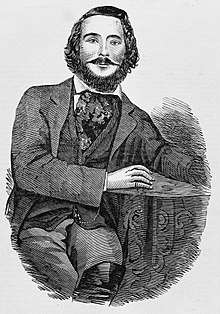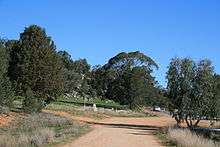Frank Gardiner
Frank Gardiner (1830 – c. 1882) was an Australian bushranger. He was born in Rosshire, Scotland in 1830, and migrated to Australia as a child with his parents in 1834. Also aboard was Henry Monro, a wealthy Scottish businessman who would soon form a relationship with his mother, Jane.[1][2][3] His real name was Francis Christie, though he often used one of several other aliases including Gardiner, Clarke or Christie. In 1835 Monro appointed his father, Charles Christie as overseer on his property at Boro Creek, south of Goulburn. In 1837 Monro obtained the lease for a property on the Campaspe Plains, about 80 km northwest of Melbourne with Charles again the overseer. By 1840 Monro had the lease on another run near Hotspur, about 50 km north of Portland in western Victoria. Once again Charles was overseer and moved there with the young family.
Frank Gardiner | |
|---|---|
 Gardiner, 1864 | |
| Born | 1830 Scotland |
| Died | c. 1882 San Francisco, United States |
| Occupation | Bushranger |
| Children | John Gardiner |
Appearance
Gardiner was 5 ft 9 inches tall with an athletic build, with his brown wavy hair and hazel eyes, he was attractive with a face of a corsair and a smooth voice.[4]
Early career
In mid-1850, Gardiner was working as a stockman in central Victoria. Perhaps realising that this career meant hard work and little money, he and two accomplices stole a large mob of horses from William Morton's station near Serpentine on the Loddon, 40 km northwest of present-day Bendigo. They planned to sell the horses in Portland. However, Morton followed their tracks to Bilston's Inn, near Heywood, where the trio were arrested. Gardiner was tried under his real name, Christie, at Geelong on 22 October 1850 and sentenced to five years hard labour.[5][6]
On 20 March 1851, Gardiner was part of a work party working outside Pentridge Prison when they rushed the guards and escaped. Most of the convicts were rounded up within days but Gardiner escaped and made his way to New South Wales, perhaps stopping at the station in central Victoria where his father and younger sisters were living. There are scattered reports of him having been arrested at the McIvor diggings on suspicion of robbing the gold escort the previous week. However, there is no record of him ever appearing in court in this matter.[7]
It is likely that he moved up to NSW and teamed up with a youth named Prior to resume his horse stealing career. In February 1854 Gardiner (now calling himself Clarke) and Prior were caught trying to sell stolen horses at Yass. This time he was sentenced to fourteen years ( seven years for each charge). While imprisoned on Cockatoo Island he met the bushranger John Peisley.
Granted a ticket of leave in 1860 on the condition of staying in the Carcoar district, he soon joined Peisley, who was roaming as a lone highwayman. His ticket of leave was revoked and a warrant for his arrest for cattle stealing was issued. Briefly captured after a gunfight with two troopers at Fogg's hut near Reids Flat, Gardiner and Fogg managed to bribe one of the policemen to allow Gardiner to escape.[8]
Lachlan Gold Escort robbery


In June 1862 he bailed up the Lachlan Gold Escort near Eugowra with a gang including Ben Hall, Dan Charters and Johnny Gilbert. This hold up is considered to be one of the largest ever gold robberies in Australian history. The total value of the gold and bank-notes taken was estimated at £14,000 (approximately A$12.5 million in 2012 terms). Much of the gold was recovered by mounted police after they surprised the gang on Wheoga Hill near Forbes. What happened to the remaining gold is still the subject of much speculation and rumour. Treasure hunters still visit the area and it is even rumoured that two Americans who were thought to be Gardiner's nephews visited the Wheogo Station near the Weddins in 1912 claiming to be miners.[9][10]
Capture and exile
While the rest of the gold robbers stayed in the district and were rounded up and caught, Gardiner opted to flee to Queensland. In 1863–1864, Gardiner was living with Ben Hall's sister-in-law Kitty Brown, at Apis Creek near Rockhampton, Queensland, where he was running a general store.[11] He was recognised and reported to the police in Sydney. Gardiner was apprehended in controversial circumstances by both NSW police operating outside their jurisdiction and by troopers of the paramilitary Native Police.[12] One of the NSW policemen used Gardiner's own horse 'Darkie' during the capture. He was taken back to Sydney, and sentenced to 32 years hard labour.
Gardiner only served 10 years of his sentence when he was released by Sir Hercules Robinson, then Governor of New South Wales, after successful appeals by his two sisters. He was granted an early release, conditional on his leaving the country.
San Francisco
In late 1874, Gardiner arrived in California having travelled via Hong Kong. He is just one of many Australians exiled from this country during the bushranging era.
Gardiner owned the Twilight Star Saloon on Kearny Street in the Barbary Coast area of San Francisco. A couple of months later he relocated to a more upmarket Brannan St which was closer to the docks. Australians arriving in San Francisco would often ask about him and have a drink at his premises.
By 1882 he was out on the street, it was reported that Gardiner had overextended credit to his clientele and couldn't pay the bills.[13] There are numerous reports of his death having occurred in 1882 (Evening News, Sydney 28 August 1882 and other similar articles) and that he was buried in a paupers grave near the Legion of Honor park in San Francisco.
The circumstances of his death are not known with any degree of certainty, due in large part to the destruction caused during the 1906 San Francisco earthquake.
There are many rumours about his life there, including a claim that he married a rich American widow and had two sons. Another rumour was that he died in Colorado in 1903. None have been proven.
See also
- Frank Gardiner–Ben Hall gang
Notes
- "Barque James". Immigrant Ships Transcribers Guild. Retrieved 16 September 2018.
- Macklin 2005
- Morrison 2003
- "FRANK GARDINER". The Capricornian. 31 (41). Queensland, Australia. 14 October 1905. p. 27. Retrieved 7 May 2018 – via National Library of Australia.
- "FRANK GARDINER". The Capricornian. Rockhampton, Qld.: National Library of Australia. 14 October 1905. p. 27. Retrieved 18 April 2014.
- "Gardiner, Francis (Frank) (1830–1903)". Australian Dictionary of Biography. Archived from the original on 25 April 2014. Retrieved 18 April 2014.
- "VICTORIA". The Courier (Hobart). XXVII (2022). Tasmania, Australia. 3 August 1853. p. 2. Retrieved 7 May 2018 – via National Library of Australia.
- Bradley, P. "Ben Hall, Stories from the hard road" (2013)
- "FRANK GARDINER". The Capricornian. Rockhampton, Qld.: National Library of Australia. 14 October 1905. p. 27. Retrieved 30 May 2014.
- "EUGOWRA GOLD ESCORT ROBBERY". The Grenfell Record and Lachlan District Advertiser. NSW: National Library of Australia. 11 June 1942. p. 1. Retrieved 30 May 2014.
- "CAPTURE OF FRANK GARDINER THE HIGHWAYMAN". The Sydney Morning Herald. XLIX (8044). New South Wales, Australia. 21 March 1864. p. 12. Retrieved 7 May 2018 – via National Library of Australia.
- "ROCKHAMPTON". The Courier (Brisbane). XVIII (1887). Queensland, Australia. 14 March 1864. p. 2. Retrieved 8 September 2018 – via National Library of Australia.
- Gardiner in California, Western Star and Roma Advertiser, 8 March 1882 page 3
References
- Bradley, Peter (2019). The True History of Frank Gardiner. OCLC 9.
- Bradley, Peter (2013). Ben Hall, Stories from the hard road. ISBN 978-1-74031-081-9. OCLC 9.
- Morrison, Alec (2003). Frank Gardiner: Bushranger to Businessman 1830-1904. John Wiley & Sons Australia Ltd. ISBN 1-74031-081-0. OCLC 55534379.
- Macklin, Robert (2005). Fire in the Blood. Allen & Unwin. ISBN 1-74114-291-1. OCLC 65526832.
- White, Charles. Australian Bushranging, Gardiner "King of the Road".
- Boxall, G. E. (1974). The Story of the Australian Bushrangers. London: Swan Sonnenschein & Co. ISBN 0-14-070039-0. OCLC 219902294.
- Serle, Percival (1949). "Gardiner, Frank". Dictionary of Australian Biography. Sydney: Angus and Robertson.
- Smith, Jane (2014). Frank Gardiner. Big Sky Publishing. ISBN 9781922132673.
External links
- Frank Gardiner Infographic at the website of BWMBooks
- Frank Gardiner on the National Museum of Australia website
- "LATTER-DAY BUSHRANGERS". Bathurst Free Press and Mining Journal. NSW: National Library of Australia. 26 January 1892. p. 4. Retrieved 24 February 2012., Part 2, Part 3, Part 4, Part 5, Part 6